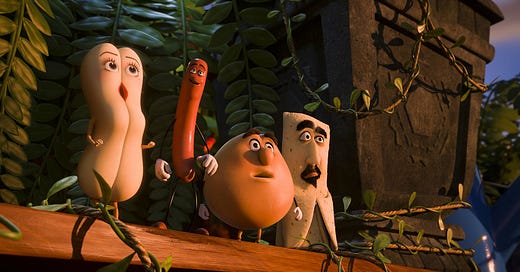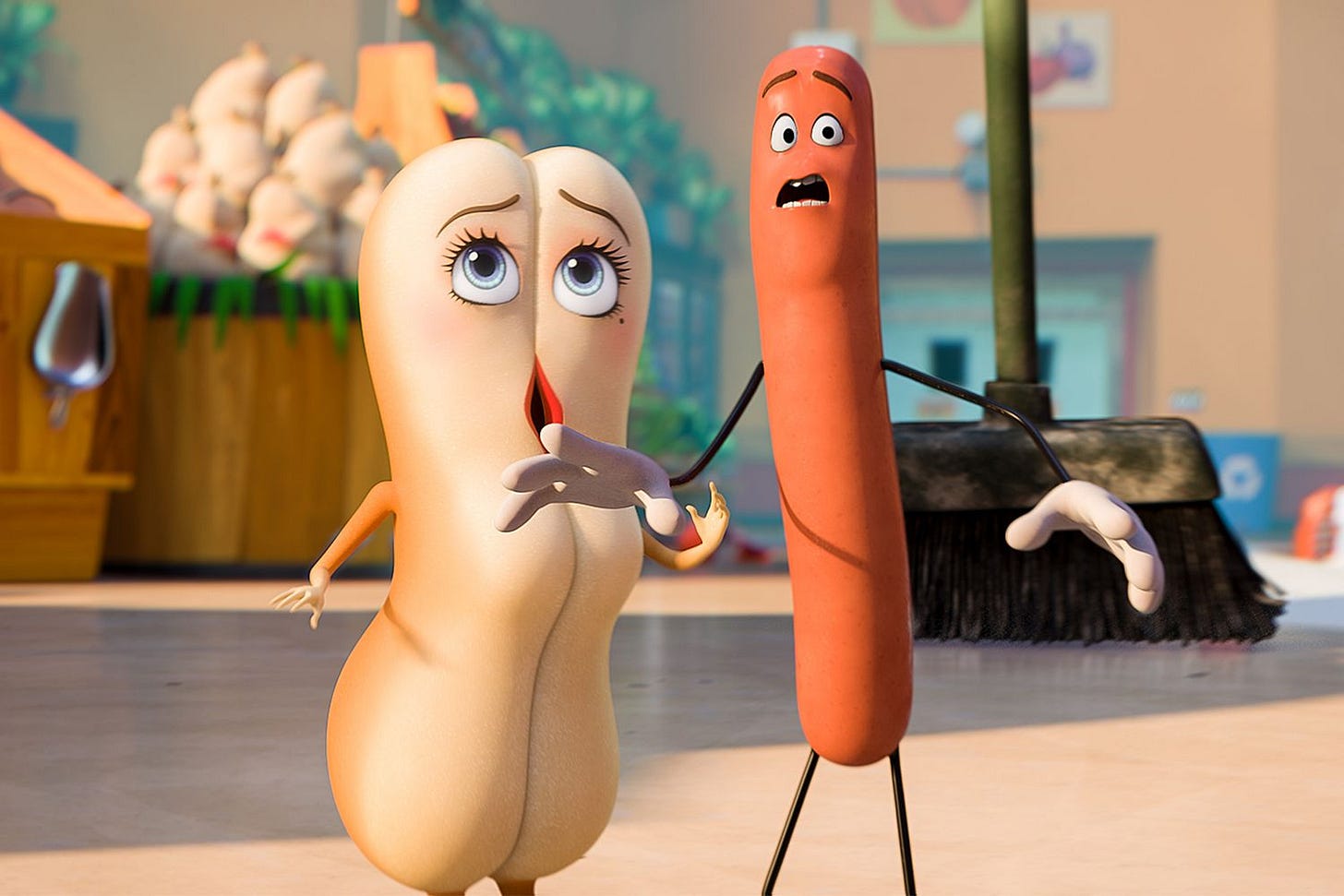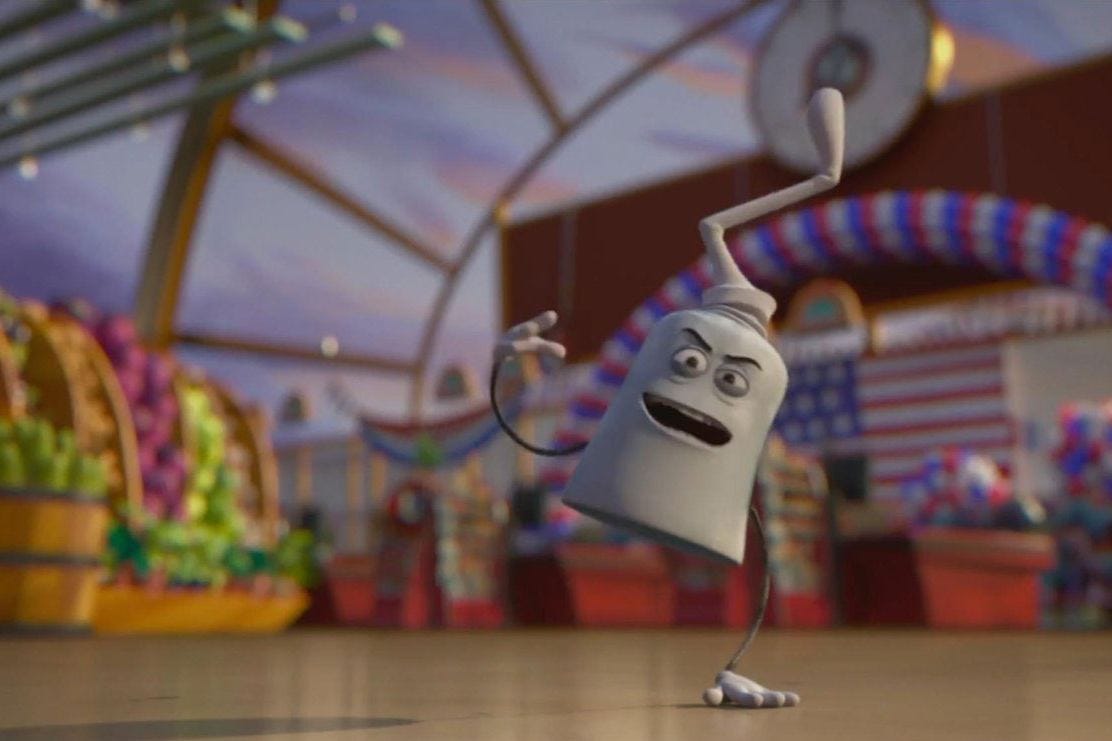Some of the movies I’ve watched during this… experiment?... remind me that there are periods when I was down that feel like ancient history. “Sausage Party”, which was released in 2016, feels like a relic from ancient history. This movie was made during the end of the Obama administration, before the election of Donald Trump, a serial sexual abuser who ran a loose-enough ship to allow psychotic cultural warriors obsessed with fifties-era mores to somehow regain a seat at a table from which they had been long disinvited. It breaks the brain to imagine “Sausage Party” getting a wide release on 3,000 screens today – a spinoff show was confined to streaming recently, a format those same culture warriors deem a no-man’s-land.
I’m joking-not-really-joking but seriously – I watched “Sausage Party” in 2024 and I cannot believe this played to packed multiplexes all over the country. This movie made $97 million in America, and $140 million worldwide, and it’s an R-rated animated movie! Interesting how it was so much bigger in America compared to other countries, since America is a region that pretty strongly enforces the notion that animation is strictly for kids. Then again, I’m certain “Sausage Party” was banned in various regions for its content. They may be purveyors of low-hanging-fruit comedy junk, but Seth Rogen and Evan Goldberg (who cowrote and produced this movie) clearly illustrate the power of America’s First Amendment with this and the fraught production of “The Interview” (which we’ll discuss at some point soon).
This is a movie about horny food. It feels insincere to try to gussy that up. The food items of a supermarket wait on the shelves to be picked up by customers. To them that’s a form of the afterlife, moving beyond the confines of the store to head to a higher plane. Collectively, they pray to the shoppers as gods who will help them reach their form of the Great Beyond. In the movie there are different types of “religions” represented by the foods, but they all sing and pray for something greater.
As the food inevitably learn, this “something greater” ain’t a thing. A returned grocery item speaks of what awaits them – a brutal massacre in the kitchen, followed by the slow, brutal devouring by those same gods they worshipped. Their hopes for an afterlife have been squashed. As such, now everyone is in question of their own destiny. At the same time, the more sexually-disciplined of them suddenly lose the need to be celibate. Faith is being questioned (resulting in suicides, if that makes sense) and hormones are raging. Frank (Rogen), the hot dog who would lead them on an escape, seems completely aware that this survival mission is a distant importance compared to the desire to mate with Brenda Bunson (Kristen Wiig), the hot dog bun that has long tempted Frank.
With the help of megaproducer Megan Ellison, Sony has gone ahead and made a big budget R-rated animated movie that is, essentially, about atheism. This blows my mind. Can you imagine this happening today? Salma Hayek voices a taco who, in learning the truth about the afterlife or lack thereof, purrs the line, “I’m not a soft taco, I’m a hard, horny taco.” But she is divided by her affections for Brenda, knowing what she has been told, that a hot dog bun and a taco just doesn’t “make sense.” To find this offensive in the current climate is to ignore that no movies are actually about theology today, and also that American movies as a whole are also terrified of actual intimacy. Would “Sausage Party” seem so transgressive if every other American movie wasn’t so buttoned up and chaste?
More importantly, you tell me – did people freak out over this movie? Did Ted Cruz have a typically-stupid opinion on this? Were there embarrassing protests? Or has the movie gotten memory-holed like so many of the massive movies of an era I missed? The top thirteen movies in America that year were either of a franchise, or starting one. Beyond that, does anyone talk about “Sully” or “The Legend Of Tarzan”, movies that outgrossed “Sausage Party”? The number four movie in America that year was “The Secret Lives Of Pets”. Is that one well-regarded? I know it generated a much-less-watched sequel, but that’s about it.
If there was any time to explore religion, it was in prison. I am sorry to say, many people have spoken positively of the connection derived while you are in captivity. I felt nothing. I pried open a Bible, tried to parse it. I spoke to God in my times of darkest terror, when I was spending nights in bed clutching a broken broom handle. I reached out, and only heard a profound nothingness.
I tried. I attended Catholic church ceremonies. It never felt right. It felt like one long performance. In my last prison, it was a Sunday detour, and there was a band allowed to play instruments. Every Sunday they shook the chapel with some Christian rock songs. The priests came from the outside, and they were kind and devout, and I never felt any sermons were out of line (conversely, I attended a church shortly after I got out of prison and the priest was trying to downplay the church’s ongoing child abuse problem). People were in positive spirits. But it never seemed authentic, mostly because it felt too much like an escape for some people. Men who didn’t want to escape the prison, they wanted to escape their own guilt.
In that last, rather devout spot, I took in a regular schedule of Christian films. In addition to public screenings, there were times you could rent out a DVD player for a couple of hours. I enjoyed the older Biblical epics with Charlton Heston and company, though it was hard to ignore, from a contemporary perspective, how transparently sexual they were in intention and vibe. More modern Christian films, like “God’s Not Dead” and “I Can Only Imagine”, were phonier and cheaper and generally a waste of time. These were films about Christians that seemed to gain their power from existing in a world where no other Christians exist, unless they were aggressively otherized. A steady diet of this stuff reminded me that, for many religious people, the world will always be us versus them.








Decarceration, did you meet many other non religious men while inside or did it just go more unspoken?
And, if you don’t mind me asking, were you raised religious by your parents growing up at all?